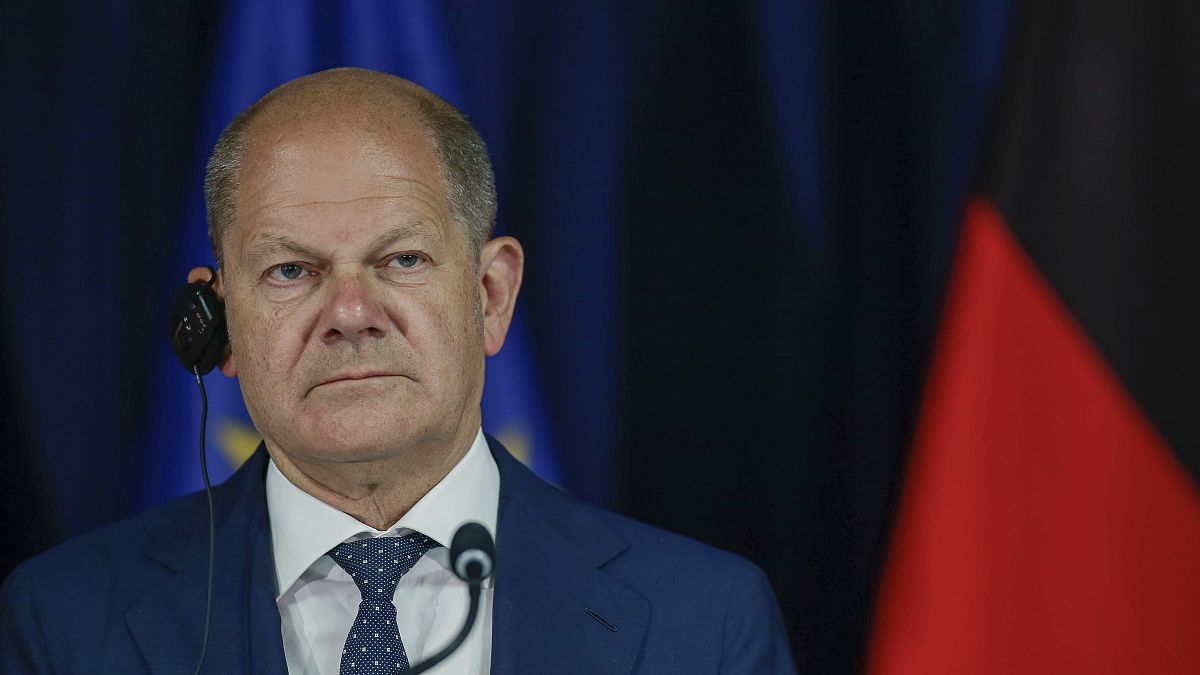After visiting Kosovo and Serbia on Friday, the German chancellor will continue his tour of the Balkans with trips to Greece, North Macedonia and Bulgaria.
German Chancellor Olaf Scholz asked Kosovo and Serbia for a clear commitment to reaching a lasting political solution to their long-standing dispute over Kosovo's independence amidst his visit to the two country's capitals.
Normalisation talks facilitated by the European Union started 11 years ago but yielded little impact, and tensions between the former opponents in war remain.
Scholz, who was first in Pristina on Friday kicking off a multi-nation trip in the Western Balkans, said Russia's war in Ukraine made the region's stability even more important.
"In times like this, the value of peace and security is made clear anew to us, and a further very weighty reason for Kosovo and Serbia to find a political solution with a comprehensive, sustainable solution that also contributes to regional stability," Scholz said at a news conference in Pristina.
The chancellor asked Serbia and Kosovo's governments for a clear commitment to the EU-facilitated dialogue.
"It is clear that an agreement must ultimately also clear up the question of the recognition of Kosovo, because it is not conceivable that two countries that don't recognize each other become members of the EU," Scholz said.
A former province of Serbia, Kosovo declared independence in 2008, a decade after a brutal 1998-1999 conflict between ethnic Albanian rebels and Serbian forces led by the regime of Slobodan Milošević.
The conflict, which escalated into serious crimes against the ethnic Albanian population by Milošević's forces as international community-led peace negotiations stalled, ended after a 78-day NATO air campaign that drove Serbian troops out, while a peacekeeping force moved in.
Most Western nations have recognized Kosovo's sovereignty, but Serbia and its allies Russia and China do not.
Kosovo to apply for EU candidacy status 'like Ukraine, Moldova and Georgia'
The six Western Balkan countries are at different stages of their EU membership aspirations. Serbia and Montenegro have started full negotiations, while Albania and North Macedonia have faced delays in the EU launching their talks after Bulgaria vetoed the latter over language, history and identity questions.
Kosovo and Bosnia are in the early stages of the membership process and have been labelled as potential candidate countries.
Kosovo's Prime Minister Albin Kurti said the country would apply for EU candidacy status as Ukraine, Moldova and Georgia have done, since joining the EU as "the only future" for the nation of 1.87 million, according to him.
Scholz praised Kosovo for supporting EU sanctions against Russia over the invasion of Ukraine, calling the government in Pristina "a reliable partner".
He also reminded the Serbian government that any country hoping to become an EU member should abide by its laws and customs.
Scholz then left Pristina for Belgrade, where he was greeted by Serbian President Aleksandar Vučić at the airport, followed by a formal meeting on Friday afternoon.
At a press conference after the talks, Vučić hailed what he said was continuously improving economic cooperation with Berlin, stating that German companies now employ as many as 77,000 Serbians.
He also lauded Scholz as someone who has brought new hope for everyone in the Western Balkans, Serbian national TV RTS reported.
"He wants to listen to us and wants a constant EU accession perspective, which is an important message to all in the Western Balkans," Vučić said.
However, the Serbian president also pointed out that Scholz has asked that his government joins the bloc's sanctions against the Kremlin, stating that the German chancellor offered to help the country deal with any consequences in acquiring gas and oil that would result from the move.
Serbia has not joined EU sanctions on Russia, claiming neutrality, with questions raised over Vučić's close ties to Moscow and Beijing. Serbia is also heavily dependent on Russian energy.
After Kosovo and Serbia, Scholz plans to visit Greece, North Macedonia and Bulgaria on his Balkans trip.
In Tallinn, Austrian Chancellor Karl Nehammer urged Friday that Western Balkan countries seeking EU membership should not be forgotten as Ukraine knocks at the bloc's door.
"We must give these states the same chance as Ukraine. They need this just as urgently and have been waiting for decades in some cases," Nehammer, who was in the Estonian capital to meet with Prime Minister Kaja Kallas, said. "We can't leave out the Western Balkan countries, but also Moldova."
The EU's 27 nations have been united in backing Ukraine's resistance to Russia's invasion, adopting unprecedented economic sanctions against Moscow since the start of the war in February.
European leaders are expected to consider Ukraine's bid for EU candidate status at the end of June.
